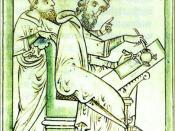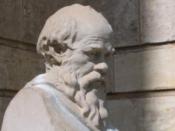Brief essay on disagreement with assertion that knowledge is kept through recollection. Cites Phaedo by Plato
In Phaedo 73b to 77, Plato argues that learning is in fact recollection of knowledge because that since the soul existed in previous lives, it contains knowledge from previous lives. This argument is weak because of how most people learn, what age they learn it at, and how they are taught.
In the dialogue between Socrates and Simmias, they first agree that the soul does not die with the body but lives on, spending some time in Hades and then returning into a newly borne body. This is repeated with each subsequent death. Socrates, having argued this and Simmias agreeing, says that the soul also has the capability of retaining information gathered during previous lives. He starts with this example:
"You know what happens to lovers: whenever they see a lyre, a garment, or anything else that their beloved is accustomed to use, they know the lyre, and the image of the boy to whom it belongs comes into their mind.
This is recollection, just as someone, on seeing Simmias, often recollects Cebes, and there are thousands of other such occurrences."
Here he introduces the basics of recollection; the ability to remember information gathered earlier and to abstractly associate it with objects and ideas. He then introduces a new idea that people always know what equality is. By equal, he means it as an idea of what is just and does not exclusively refer to equal as meaning the same. From this concept, one is able to determine if two tangible objects are equal. Therefore, one must have a firm understanding of the concept the Equal and we must have it at or before the time of birth. Since this concept cannot be developed...


